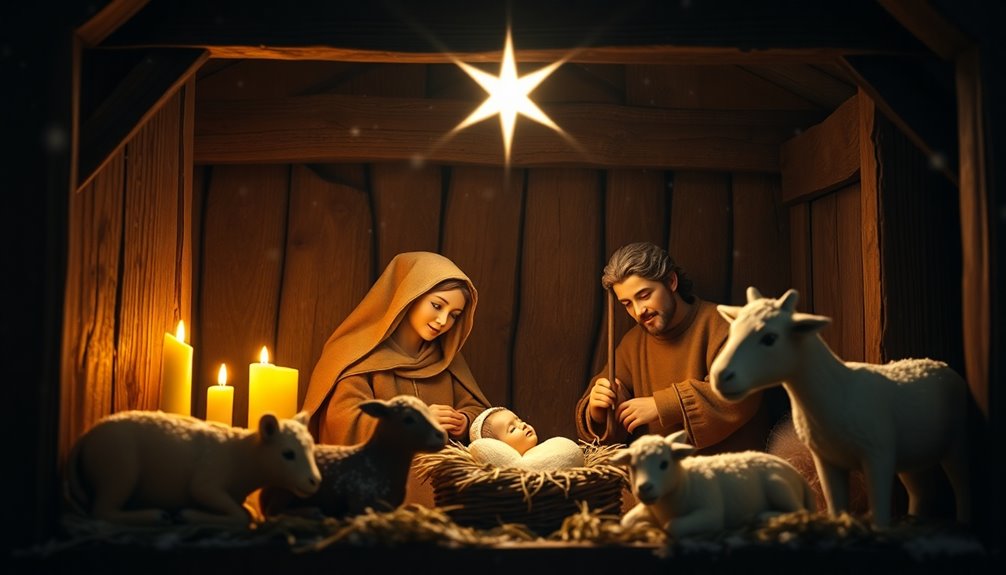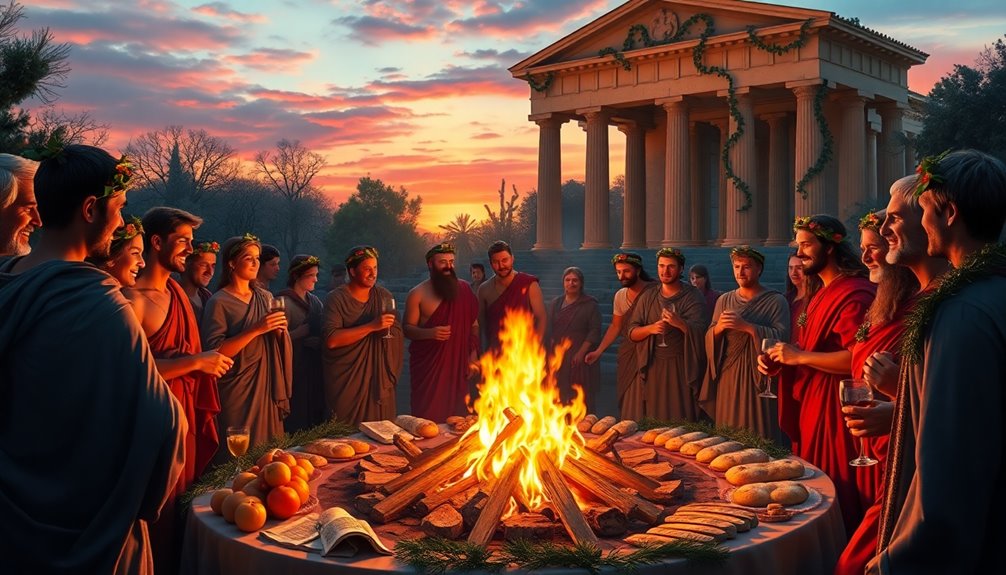The true meaning of Christmas isn't just about gifts and decorations; it's about embracing love, hope, and joy. You celebrate the birth of Jesus, the "Prince of Peace," and reflect on the importance of kindness and generosity within your community. This holiday reminds you to prioritize togetherness and goodwill over materialism. While traditions may vary, the essence lies in the spirit of giving and creating lasting memories with family and friends. By shifting focus from consumerism to compassion, you can honor Christmas's true purpose. Discover more insights that can enhance your understanding of this festive season.
Key Takeaways
- The true meaning of Christmas centers on celebrating Jesus Christ's birth, symbolizing hope, love, and peace for humanity.
- Acts of kindness and generosity reflect the spirit of Christmas, honoring the selflessness of Jesus' teachings.
- Engaging in community service and charitable acts fosters connection and embodies the essence of goodwill during the holiday season.
- The holiday encourages spiritual reflection, reminding individuals to focus on faith rather than the commercialization of the season.
- Christmas traditions, like gift-giving, should emphasize meaningful connections rather than materialism, promoting love and unity.
Introduction

Christmas is a season that, while often filled with festive decorations and gift-giving, fundamentally revolves around the celebration of Jesus Christ's birth. This moment marks the arrival of the Prince of Peace, who embodies God's love and salvation for humanity.
The true meaning of Christmas isn't just about the presents or the decorations; it's about reflecting on the significance of this miraculous event and what it means for your life.
As you participate in the holiday festivities, take a moment to embrace themes of love, hope, and joy that are deeply rooted in Christian beliefs. These values inspire you to engage in acts of kindness and generosity, fostering a sense of community and connection with others.
Even in a world increasingly focused on commercialization, Christmas serves as a powerful reminder of faith and the importance of spiritual ties.
The phrase "true meaning of Christmas" emerged in the mid-19th century as a response to the growing secularization around this holiday. By focusing on the birth of Jesus Christ, you can rediscover the essence of Christmas and reconnect with what truly matters during this special time of year.
Biblical Insights on Christmas

When you explore the biblical insights on Christmas, you'll find powerful messages in both primary and secondary references.
The angel's proclamation to the shepherds and the prophecies of Isaiah highlight the significance of Jesus' birth and its impact on humanity.
These scriptures invite you to reflect on the themes of hope, love, and divine presence in your own life.
Primary Bible References
Many people turn to the Bible for insights into the true meaning of Christmas, where several key passages illuminate the significance of Jesus' birth. In Luke 1:30-31, the angel Gabriel announces to Mary that she'll conceive a son, underscoring God's plan for salvation through the Messiah. This moment marks the beginning of the miraculous birth of Christ, fulfilling divine prophecy.
In Luke 2:10-11, the angel reassures the shepherds, declaring, "Fear not, for behold, I bring you good news of great joy that will be for all the people." This message emphasizes the universal hope Christmas brings.
Matthew 1:23 highlights Jesus as "Immanuel," meaning "God with us," illustrating God's intimate presence in humanity.
The visit of the wise men in Matthew 2:11 acknowledges Jesus' divine kingship through their gifts, symbolizing His royalty, divinity, and sacrificial purpose.
Finally, Simeon's proclamation in Luke 2:30-32, "For my eyes have seen your salvation," signifies the fulfillment of God's promise, presenting Jesus as the light to the Gentiles and the glory of Israel.
These passages together encapsulate the essence of Christmas.
Secondary Bible References
Numerous secondary Bible references provide deeper insights into the significance of Jesus' birth. In Matthew 1:21, you see an emphasis on Jesus' mission: Mary will give birth to a son named Jesus, who'll save His people from their sins. This highlights the redemptive purpose behind His arrival.
Luke 2:10-11 brings joy to the shepherds as the angel announces the birth of a Savior, reinforcing the idea that Jesus is the fulfillment of God's promise.
Prophecy in Isaiah 9:6 calls Jesus Wonderful Counselor, Mighty God, Everlasting Father, and Prince of Peace, which underscores His divine nature.
John 1:14 states, "The Word became flesh and made His dwelling among us," illustrating the profound mystery of God becoming man in the person of Jesus during this holy season.
Furthermore, Galatians 4:4-5 affirms that God sent His Son, born of a woman, to redeem those under the law, encapsulating the theological significance of Jesus' birth for humanity.
Together, these references deepen your understanding of Christmas, revealing that Jesus' birth isn't just an event but a pivotal moment in God's plan for salvation.
Ancient Roman Winter Solstice Celebrations

The joy of ancient Roman winter solstice celebrations, particularly Saturnalia, transformed the darkest days of the year into a time of revelry and community. This festival, honoring the god Saturn, kicked off on December 17 and lasted for a week. During this period, businesses closed, and public festivities took center stage.
You'd find people feasting, exchanging gifts, and enjoying a temporary reversal of social roles, where slaves and masters would switch places, fostering a sense of equality. Homes were adorned with greenery, creating a festive atmosphere that you'd feel in the air.
Banquets filled with food and drink brought families and friends together, deepening community bonds. Interestingly, December 25 also marked the celebration of Sol Invictus, the sun god's birthday, a date that would later align with the Christian celebration of Christmas.
These winter solstice traditions laid the groundwork for the customs that would evolve into modern Christmas practices. Early Christians adapted and transformed these pagan festivities, blending them into their own celebrations.
Cultural Significance of Christmas

Christmas holds a profound cultural significance that transcends its religious origins, celebrating values like love, hope, and goodwill. While it marks the occasion of celebrating the birth of Jesus Christ on December 25th, its impact reaches far beyond Christianity.
You see communities worldwide embracing various customs, such as gift-giving, decorating Christmas trees, and gathering for festive meals, which have all become integral to its cultural fabric.
In the United States, Christmas was established as a federal holiday in June 1870, showcasing its importance in American culture. This celebration isn't just about religious observance; it represents a time for families and friends to come together, fostering connections and creating lasting memories.
Movies like "A Charlie Brown Christmas" have further shaped public perceptions, emphasizing themes of authenticity and selflessness.
These cultural narratives highlight what Christmas truly means—an opportunity to express kindness and compassion. Amid the hustle and bustle, the holiday reminds you to reflect on the deeper values it embodies, reinforcing the idea that love and community should be at the heart of this cherished celebration.
Misunderstanding Christmas's Commercialism

You might notice that Christmas is often wrapped in glittering advertisements and endless shopping lists, which can make it feel more about consumerism than its true spirit.
Many traditions you cherish may unintentionally promote this commercial mindset, overshadowing the holiday's deeper meaning of hope and goodwill.
It's time to unpack these myths and critique how we celebrate, ensuring the essence of Christmas shines through.
Debunk Christmas Commercialism Myths
Debunking myths about Christmas commercialism reveals a complex relationship between tradition and consumerism. You might believe that the true meaning of Christmas is lost in a sea of gift exchanges and lavish decorations, but that's just one side of the story.
The commercialization of Christmas has roots that stretch back to the mid-19th century, influenced by works like "A Visit from St. Nicholas" and "A Christmas Carol." These literary pieces shifted the holiday's focus toward materialism, sparking the debate you see today.
While it's true that holiday shopping significantly boosts retail sales, it's essential to recognize that this pressure to consume doesn't define the season. Critics, including notable figures like Harriet Beecher Stowe, have long pointed out the disparity between the original spiritual significance of Christmas—celebrating Jesus's birth—and the modern emphasis on consumer culture.
This ongoing conversation reflects a societal struggle to find balance. You can appreciate the joy of giving and receiving gifts while still honoring the deeper meaning behind the holiday.
Critique of Christmas Traditions
Amid the twinkling lights and bustling shopping aisles, many struggle to grasp the true essence of the holiday. The commercialization of Christmas has shifted your focus to consumerism, often overshadowing the holiday's original meaning centered on the birth of Jesus Christ.
You might notice that Christmas has become synonymous with shopping, gifts, and extravagant decorations, which detracts from its spiritual significance. This disconnect can lead to cynicism, as you observe a stark contrast between festive cheer and pressing global issues.
The phrase "true meaning of Christmas" emerged in the mid-19th century to combat this growing secularization. Figures like Santa Claus symbolize this shift, diverting attention from the holiday's message of hope and peace.
Modern critiques emphasize the importance of returning to foundational themes: love, generosity, and community service. To truly celebrate Christmas, you need to look beyond the commercial frenzy and reconnect with these values.
Family Volunteering During Holidays

Volunteering as a family during the holidays can create meaningful gift-making traditions that strengthen your bond.
Whether you're crafting homemade gifts or participating in community service opportunities, these activities teach valuable lessons about compassion and generosity.
Together, you can make a positive impact while creating lasting memories that embody the true spirit of Christmas. Additionally, engaging in community service can also help families understand the importance of financial planning when giving back during the holiday season.
Family Gift-Making Traditions
During the holiday season, many families find joy in gift-making traditions that prioritize creativity and connection. Instead of rushing to the store, you and your family and friends can gather around the table to craft handmade ornaments or bake delicious treats.
These activities not only enhance your bond but also allow you to celebrate the birth of the season's true spirit—generosity and love.
By making gifts together, you teach children valuable lessons about compassion and the importance of giving. It's a fantastic way to shift the focus from consumerism to meaningful connections. As you work side by side, you reinforce shared values and create lasting memories that will stay with you long after the holidays are over.
Moreover, these gift-making traditions can serve a dual purpose. You might decide to create gifts for one another or for those in need, spreading warmth and kindness in your community.
Ultimately, engaging in these hands-on experiences enriches your family's holiday traditions and ensures that the essence of Christmas—celebrating love, togetherness, and giving—remains at the forefront of your festivities.
Community Service Opportunities
As the holiday season approaches, families can find meaningful ways to give back by engaging in community service together. Volunteering as a family not only strengthens bonds but also teaches kids the importance of helping those in need.
Consider reaching out to local organizations like food banks and shelters that offer family-friendly opportunities, such as meal preparation, food drives, and gift wrapping for those less fortunate.
Participating in local charity events, like toy drives or community clean-ups, allows your family to make a difference in your neighborhood while creating lasting memories. Studies show that volunteering enhances emotional well-being and reduces stress, fostering a sense of belonging during this festive time. Additionally, engaging in community service can help families understand difficult behavior in others, fostering empathy and compassion.
If you're feeling inspired, why not start your own community service projects? Organizing a neighborhood fundraiser or coordinating a clothing donation drive can make a positive impact in your area.
Thanks to God, families have the chance to spread joy and kindness, reinforcing the true spirit of Christmas. By dedicating time to help others, you're not just giving back; you're enriching your own lives, making this holiday season truly special.
Reflecting on Christmas's Essence

Christmas isn't just a day on the calendar; it's a profound celebration of Jesus Christ's birth that invites you to reflect on its true essence. At its core, Christmas embodies God's love, reminding you that He's Immanuel—"God with us" (Matthew 1:23). This season calls you to look beyond materialism, focusing instead on hope, peace, and goodwill.
As you embrace the themes of cradle, cross, and crown, consider how the wise men's gift-giving (Matthew 2:11) symbolizes the recognition of Christ's divine significance. When you engage in charitable acts, you're living out the spirit of selflessness and generosity that Christmas promotes. Each act of kindness not only honors the birth of Jesus but also encourages a deeper understanding of the holiday's significance.
Take a moment to reflect on the historical critiques of Christmas commercialization. Voices like Harriet Beecher Stowe remind you of the importance of returning to the holiday's original spiritual focus.
In doing so, you can experience great joy in celebrating the true meaning of Christmas, fostering a sense of community and connection that transcends the frenzy of modern traditions.
Additional Resources

Exploring the true meaning of Christmas can be enriching when you access a variety of resources designed to deepen your understanding. The Billy Graham Evangelistic Association offers a wealth of sermons and articles that can bring you good news about the biblical foundations of Christmas. Engaging with these materials can provide clarity on the holiday's spiritual significance.
Additionally, many churches provide Advent calendars and devotionals, guiding you in daily reflections that connect you to the authentic message of Christmas. These tools help you focus on the season's true spirit, rather than the distractions of commercialism.
Consider participating in community outreach programs organized by faith-based organizations. These initiatives highlight the importance of charitable giving and service during the Christmas season, allowing you to embody the holiday's spirit through acts of kindness and generosity.
Online platforms also feature discussions that explore holiday traditions critically, helping you discern between the commercial and the genuine. By utilizing these resources, you can enrich your understanding and experience of Christmas, making it a time of meaningful reflection and connection.
Frequently Asked Questions
What Is the True Meaning of Christmas?
When you think about the true meaning of Christmas, it's easy to get lost in the hustle and bustle.
You might feel pressured to buy gifts or plan the perfect celebration. Instead, consider focusing on love, kindness, and connection with those around you.
Embrace the spirit of giving, reflecting on the joy and hope this season can bring.
It's a time for togetherness, gratitude, and creating cherished memories that last beyond the holiday.
What Is the Main Message of Christmas?
The main message of Christmas revolves around love, hope, and joy.
You celebrate the spirit of giving, reflecting kindness and generosity towards others. This time of year reminds you to cherish relationships and spread warmth, despite life's challenges.
It encourages you to embrace peace and goodwill, fostering connections within your community.
Ultimately, you find comfort in the shared experiences and the joy that comes from bringing happiness to those around you.
What Is the Real Story Behind Christmas?
The real story behind Christmas revolves around the birth of Jesus Christ.
You'll find that early Christians chose December 25 to coincide with pagan celebrations, making it easier to spread their faith.
The Nativity story showcases themes of hope and joy, especially through the angel's announcement and the wise men's visit.
This event marks a pivotal moment in history, highlighting Jesus as a symbol of peace and divine presence amidst a world filled with despair.
What Is the True Essence of Christmas?
The true essence of Christmas lies in celebrating love, hope, and togetherness.
It's a time when you gather with family and friends, sharing joy and goodwill. You might reflect on giving and kindness, embracing the spirit of generosity that the season brings.
As you exchange gifts and create memories, remember to appreciate the warmth and connection that binds you to those you cherish.
This season encourages you to spread joy and compassion in your community.










